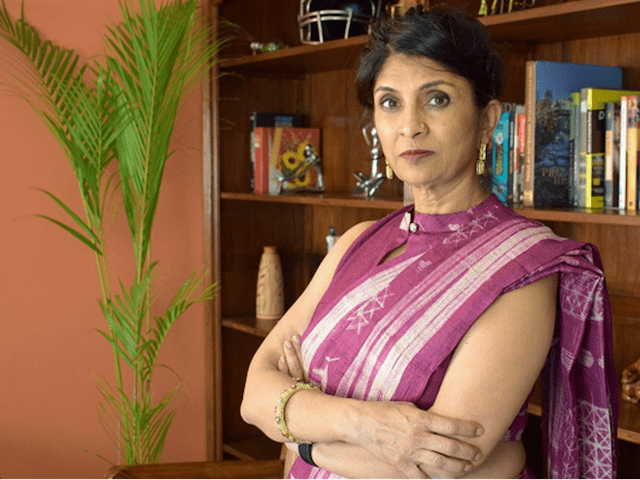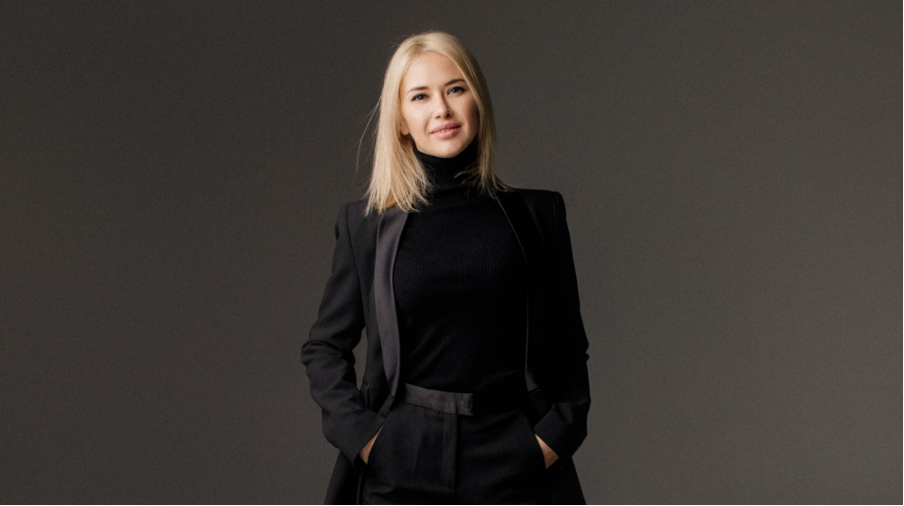As time changes, the rise of female entrepreneurs in India has shown that women in business are capable of matching the success of their male counterparts.
Especially in a country that is deeply patriarchal in several areas, it’s not just difficult but challenging for female entrepreneurs. Women here are still considered to be emotional, less ambitious, and not supposed to lead an initiative and turn it into a profit-making business.
But here’s the fact – women in India are no longer held bound by this perception. They are equivalent to males when it comes to starting or running a profitable business. And we know this because we have seen it.
Why is female entrepreneurship in India important?
Women's entrepreneurship in India plays a pivotal role in driving economic growth and social development. By empowering women to become entrepreneurs, the country can harness underutilized talent and increase economic participation across various sectors.
1. Economic growth and innovation
Female entrepreneurs contribute to economic growth by creating jobs and fostering innovation. By introducing new products and services, they enhance consumer options and drive competition. Women-led startups often bring unique perspectives to the market, leading to innovative solutions that address diverse consumer needs.
2. Social empowerment
Empowering women through entrepreneurship promotes gender equality and social empowerment. It allows women to gain financial independence, make significant contributions to their families' well-being, and become role models for future generations. The ripple effect of successful women entrepreneurs can inspire more women to pursue entrepreneurial ventures, leading to a more inclusive society.
3. Enhancing the startup ecosystem
The inclusion of women in entrepreneurship strengthens the startup ecosystem by diversifying leadership and decision-making. Women entrepreneurs often emphasize sustainable practices and community welfare, adding a new dimension to business operations.
Challenges faced by female entrepreneurs in India
Despite the increase in female entrepreneurship, female entrepreneurs continue to face several unique challenges that can hinder their entrepreneurial journey.. These challenges often range from lower personal financial assets to gender discrimination and social taboos.
Although the word entrepreneur is a gender-neutral term, it has long been reserved for men.
While the success stories of these entrepreneurs are often chronicled, their hardships and struggles are rarely touched upon.
1. Access to finance
One of the major hurdles is the lack of access to finance. Women often struggle to secure funding due to gender biases and a lack of collateral. This financial barrier limits their ability to scale their businesses and compete in the market.
2. Societal norms and gender bias
Societal norms and gender stereotypes can discourage women from pursuing entrepreneurship. Traditional gender roles often impose additional responsibilities on women, making it difficult for them to balance work and family life.
3. Limited networking opportunities
Networking is crucial for business success, yet women entrepreneurs often have fewer opportunities to connect with influential business leaders and mentors. This lack of access to professional networks can limit their business growth and development.
4. Lack of mentorship
While mentorship is essential for entrepreneurial success, aspiring female entrepreneurs in India often find it challenging to access mentorship programs. Having experienced mentors can provide guidance, support, and valuable insights into navigating the business landscape.
Below, we’ll list some female entrepreneurs in India who’ve defied norms, taken risks, faced obstacles and reached the pinnacle of success.
Female entrepreneurs taking India by storm
The notable female entrepreneurs listed below come from different walks of life in India.

All started from scratch or with very little support, whether it be finance or experience.
Yet, they’ve all reached the peak of their career by changing the business landscape of India. Read on to see how these women touched upon lives with their sheer grit, determination and strength of purpose.
1. Falguni Nayar – Founder of Nykaa
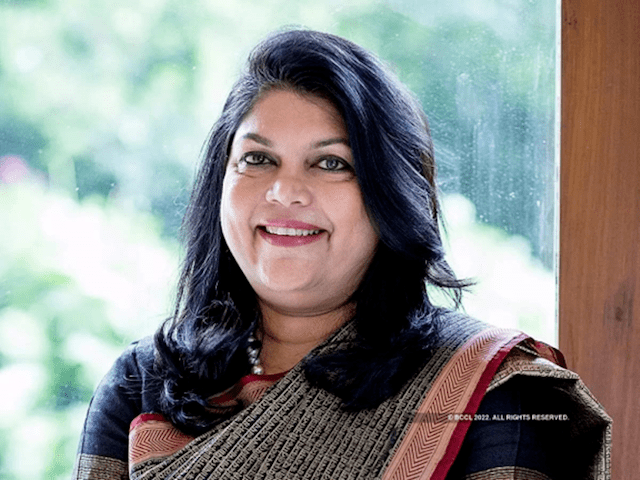
When it comes to talking about female entrepreneurs in India, it’s hard to miss Falguni Nayar. Born and raised seeing her father running a small business, Ms. Nayar bid adieu to her position as the Managing Director of Kotak Mahindra Capital at the age of 50 to start her own business from scratch. That’s how a future unicorn was born.
Nykaa revolutionized the beauty and wellness industry in India by providing a comprehensive e-commerce platform that offers a wide range of products from global and domestic brands. Under Falguni's leadership, Nykaa became a household name and a successful business model for aspiring entrepreneurs.
Moment of inspiration
Ms. Nayar was an IIM Ahmedabad alumnus for approx 20 years. She worked as a venture investor and merchant at Kotak Mahindra Group. After running the group’s global operations in the US and UK, she started as the head of the institutional equity division. In 2005 she was appointed as the MD of Kotak Mahindra Capital.
She took the leap of faith and left her job to start an online retailer of beauty products, Nykaa in the year 2012.
She left her ‘ideal’ and ‘secure’ job behind to follow her passion at the age when most people start planning about retirement. She observed the market and found a gap.
Drawing inspiration from real-life success like Ronnie Screwvala of UTV and Ajay Bijli of PVR Cinemas, she built the headquarters of Nykaa in Mumbai – the place she was born and brought up.
Notable success
The story of Ms. Nayar as well as her brand’s growth is phenomenal. The company witnessed a growth of 100% year after year for many consecutive years.
Today, Nykaa is the home for 1000+ beauty and luxury brands. In 2020, Nykaa became the first Indian unicorn that was led by a woman. As of November 2021, the company’s net worth was $13 billion.
2. Aditi Gupta – Co-Founder of Menstrupedia

Not every day do we get to see entrepreneurs who start their journey to make a change. A change that could actually help solve a real problem for millions of people. Such an entrepreneur is Aditi Gupta.
Aditi’s small initiative helped thousands of girls get an education about something Indians don’t like to talk about openly, even today.
Moment of inspiration
By means of an Indian conservation family belief – a woman, during her menstrual period is prohibited to enter the kitchen or the place of worship. She is not allowed to cook or do various chores even at her own house.
While how absurd this sounds, it’s a very common belief in the majority of rural and definite urban areas in India.
Born and brought up in a very small city of Jharkhand in India, Aditi got her first period at the age of 12. Even at that tender age, she had to sleep in a separate area in her house, wash her clothes separately, and wasn’t allowed to participate in any worship-related activity, every time she got her period.
That’s what Aditi wanted to change with her small yet effective initiative – Menstrupedia.
Aditi started Menstrupedia, a Hindi comic book with her husband Tuhin Patel in 2012. The whole idea behind that comic was to create awareness and knowledge about menstruation and hygiene.
Notable success
Within two years since the inception of Menstrupedia, Aditi was listed in the Forbes 20 under 20 list for her commendable job in breaking the taboos related to menstruation in India.
By now Menstrupedia has educated over 10,00,000 girls and trained 10,000+ educators to spread awareness about puberty, menstruation, and hygiene.
3. Vani Kola – CEO of Kalaari Capital
Born in Hyderabad, Vani completed her graduation with a degree in Electrical Engineering from Osmania University. After graduation, she moved to the US and did her master’s degree from Arizona State University.
After completing her education, she began working in the tech industry with renowned companies like Empros, Control Data Corporation, and Consilium Inc.
After continuing as an employee for over 12 years, she started her own venture, RightWorks, an e-procurement company in 1996.
After selling RightWorks in 2001, she started Nth Orbit, a company dealing with supply chain software development in San Jose. Later under this company, a software called Certus was developed which was purchased by PepsiCo.
Moment of inspiration
After working as an employee and then founding two companies, Vani decided to come back to India after 22 years and take on a new adventure in 2006.
The same year, she started her journey as a venture capitalist.
For a month, she traveled and met people around India to understand the Indian market.
After extensive market research, Vani started noticing the signs of potential for growth in startups. The same year she started Indo-US Venture Partners (IUVP), in partnership with New Enterprise Associates (NEA) alongside Vinod Dham.
After four years of operations, she went solo and rebranded her firm as Kalaari Capital. Kalaari focused on investing in early-stage, tech-based startups across India. The company believed in investing in startups that:
- No other company is willing to invest in
- Have the potential to grow and become a leader in its niche
That’s how Kalaari started to help new startups and also built its name in the industry.
Today, Kalaari has over 200 assets under it and has raised a capital of over $740 million. Some of its portfolio companies are, WinZO, CashKaro, Dream11, Active.ai, and Industrybuying.
Notable success
Vani has been awarded as “India’s Most Powerful Women in Business” by both Forbes and Fortune Magazine and she’s also known as the “Mother of Venture Capitalism in India.”
4. Priya Paul – Chairperson of Park Hotels
Priya Paul is considered one of the most successful female entrepreneurs in India and a legendary figure in the hospitality industry. She hails from a prestigious business family, Apeejay Surrendra Group.
After completing her graduation in Economics from Wellesley College in the U.S, Priya joined the family business at the marketing Division of Park Hotels. She initially reported to her father and Chairperson, Surrendra Paul. In less than two years, she became the Acting General Manager of The Park, New Delhi.
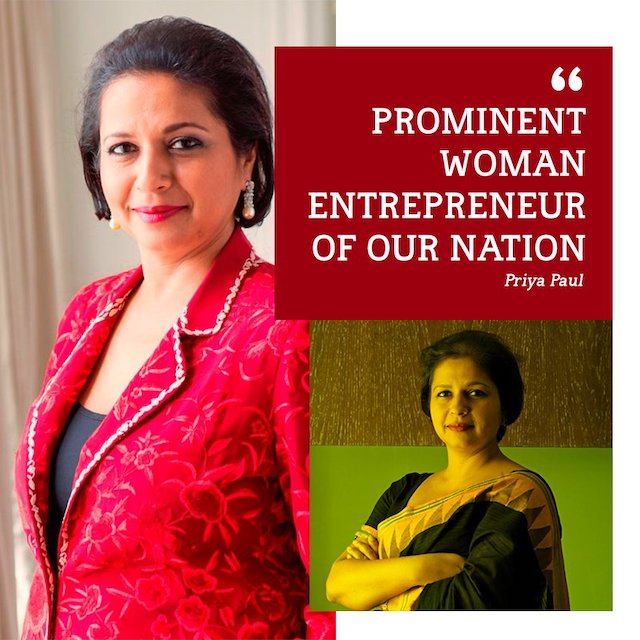
However, in 1990, she lost her father in a tragic incident when the ULFA militants gunned down Surrendra Paul. Only one year before that incident, Priya’s younger brother Anand died in a car accident. These incidents left a vacuum both in the family and at the workplace.
Moment of inspiration
At a very young age of 23, and with very little experience, Priya was left to manage all three hotels of The Park – a huge challenge that she solemnly took up. Soon, she realized the hotels needed a major renovation and created a kind of revolution in India’s hospitality industry.
Priya single-handedly introduced the concept of boutique hotels in India.
Besides, trendy and contemporary designs and interiors – a sharp contrast to the country’s archetypical 5-star properties – she introduced innovative concepts such as:
- Amusing corners for guests to hang out
- Themed lounges
- In-vogue restaurants
She also experimented with the menus and music. Her initiatives helped her hotel chain tackle the recession of the early 1990s.
Notable success
Today, she owns a chain of six hotels across major cities including Kolkata, New Delhi, Chennai, Bangalore, Hyderabad and Visakhapatnam. This mompreneur is known for her innovation, strong will and spontaneity. She credits meditation as the tool that helps her stay calm and motivated.
Priya is also a recipient of numerous prestigious awards, including the Padma Shri award given by the Indian Government in 2012.
5. Kiran Mazumdar-Shaw, Founder of Biocon

Kiran graduated college in the late 1970s with a B.Sc. in Biology and Zoology. However, she aspired to follow in her father’s footsteps later in life. Her father’s work, as the head brew master for one of India’s largest beer companies, inspired her to change her career.
Shortly after, she headed to Australia to train as a brew master. Her intentions were to return to India and obtain a job with her newfound knowledge.
However, the Indian brewing industry was heavily male dominated (still true today) and employers refused to offer her a job.
In an interview with The Financial Times, Kiran recalls, “I was being politely told, ‘we are very impressed with your qualifications, but this is not a woman’s job.”
Moment of inspiration
Undeterred and with little support, she decided to start her own venture and began building her own business from scratch. She understood that entrepreneurship was traditionally a male bastion and that the country wasn’t kind to women in business, but she chose to persevere anyway.
Luckily, she met an Irish entrepreneur, Leslie Auchincloss, who was looking for an Indian partner to produce enzymes – a role that suited her interest in biology. Kiran launched Biocon India in 1978 as a joint venture with Ireland-based Biocon Biochemicals, retaining a 70% stake in the company.
She started the business in the garage of her rented house in Bengaluru with a seed capital of Rs. 10,000.
Notable success
Today, Biocon is one of India’s largest biotech companies, with a market capitalization of nearly $7bn on the Bombay Stock Exchange. And Kiran Mazumdar-Shaw is India’s first self-made Indian female billionaire, and an inspiration to hundreds of male and female entrepreneurs.
Have a great idea for a business? Claim your online identity by registering the domain name now:
6. Richa Kar, Co-Founder & CEO of Zivame

Richa Kar was born in Jamshedpur and comes from a very conservative family. After completing her engineering from BITS Pilani, followed by a brief stint in the IT sector, she moved on to complete her master’s from Narsee Monji Institute of Management Studies in 2007.
Soon after, she worked at SAP Retail Consulting, a company that helped her gain valuable retail experience. One of her clients included the famous lingerie company, Victoria’s Secret.
This opportunity offered her a chance to research the Indian lingerie market, where she realized a social discomfort that was causing a myriad of issues for both women shoppers and retailers.
Moment of inspiration
To solve this problem, she developed a business idea to help women understand their lingerie needs and get the right products without hassle. In 2011, she co-founded Zivame (meaning “radiance” in Hebrew) with her friend Kapil Karekar to put her ideas into play.
Initially, she had to overcome several challenges -- including pushback from her family. The idea of talking about lingerie was a major taboo in India. Another big challenge was finding ways to finance her endeavor. In the initial phase, Richa borrowed Rs. 30,00,000 from friends and close family.
The founders started in a small office space. As the business grew, the company secured funding from investors including IDG Ventures, Kalaari Capital and Unilazer Ventures.
Notable success
In three years, Zivame grew from a small business to a team of more than 200 members. It is now one of India’s leading online lingerie stores, making Richa one of the most influential female entrepreneurs.
Related: Build an online store with GoDaddy and become an entrepreneur yourself.
7. Jyoti Naik, Ex-President, Shri Mahila Griha Udyog, Lijjat Papad
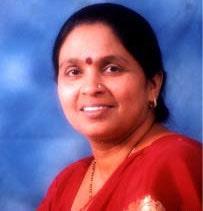
Jyoti Naik was 12 years old when she joined her mother in the business of making papad (a thin, crisp, round flatbread from India) in the early seventies. The brand they worked for, Shri Mahila Griha Udyog Lijjat Papad, was started by seven women way back in 1959 with a modest loan of Rs.80.
Growing up, Jyoti was the eldest among her four brothers and sisters. After the sudden demise of her mother in 1976, she continued working various jobs at Lijjat Papad while caring for her four siblings.
Moment of inspiration
Eventually she became president in 1999, where she helped build a sustainable business model within the company and employed many village women.
Her contributions to Lijjat Papad’s unique business model imparts a sense of equality and justice. It serves to equip Indian women with dignity, self-reliance and self-respect.
Notable success
Although Jyoti has since retired, she helped expand the women's cooperative into becoming a household name.
Many consider this to be one of the first pioneers of India’s co-operative movement.
It is now manufactures and sells various products including:
- Papad
- Spices
- Wheat flour
- Detergent powder
- Detergent cake
- Liquid detergent
With the help of Jyoti, Lijjat Papad has become an entrepreneurial success story employing over 43,000 and has 81 branches across the country. It also includes a turnover of over USD 100 million.
During her tenure, Jyoti received many awards and accolades including ‘Vandemataram Rashtriya Seva Award’ for her efforts towards the empowerment of women, and a PHDCCI Brand Equity Award given to her by Dr.A.P.J.Abdul Kalam.
8. Upma Kapoor, Founder of Teal & Terra

Born and raised in Delhi, Upma lost both her parents in a tragic accident when she was 12 years old. She went to live with her sister and brother-in-law and completed her MBA in finance from ICFAI.
Moment of inspiration
She worked in the corporate sector for almost 15 years and then left her cushy job to venture into the beauty industry. Entrepreneurship was always at the back of her mind, which inspired her to create Teal & Terra.
Upma funded Teal & Terra with her savings and contributions from friends and family.
The company banks on the age-old wisdom of Ayurveda and its cosmetic products are all-natural. Priced from Rs. 500 onwards, Teal & Terra primarily produces hair and skin care products.
Notable success
In a short span of time, Teal & Terra has been able to position itself as an acclaimed brand in the beauty industry, with a chunk of its revenue coming from repeat buyers.
The shift from the service industry to entrepreneurship wasn’t an easy ride.
There were many challenges in the path, including brand acceptance and stiff competition from the established players in the segment. She also had to struggle to maintain a healthy work-life balance as a single mom (or mompreneur).
Nonetheless, within a significantly short span of time, all the hard work and perseverance has paid off. Upma started with about Rs 7.5 lakh and in just two years since its launch, Teal & Terra has clocked in a revenue of Rs 2.24 crore and managed to carve a niche of its own.
9. Vandana Luthra – Founder of VLCC

Vandana Luthra started VLCC as a wellness center in 1989 on a small bank loan, with a focus on health and beauty in New Delhi.
Over the years, she has endured criticism and competition to become a wellness queen – a concept that was an alien concept way back in the 1980s.
Born into an educated middle-class family, her father was a mechanical engineer and her mother was an Ayurvedic doctor who ran an organization called Amar Jyoti.
Moment of inspiration
Like her parents, Vandana was inspired by the idea of impacting someone’s life and making the world a better place to live in. She later followed her dreams by traveling to Europe to study beauty and wellness. Vandana started the wellness and beauty giant VLCC back in 1989 when her daughter was just a toddler.
She faced the typical challenges of a mompreneur, while trying to balance a healthy work-life at home.
Besides entrepreneurship being a male-dominated space, she also faced strong criticism in the initial stages of her branding. She often had to convince doctors and the medical fraternity about the concept of wellness.
Convincing them meant she had to recruit a variety of experts in the beauty, health and fitness fields to show that holistic healthcare was here to stay -- and not just a fad.
Notable success
Her company has since grown from the small office she held in Delhi. Today VLCC has spread its wings to 11 countries in Southeast Asia, the GCC Region and more recently East Africa.
The company also has two manufacturing units, one in Haridwar, India and another in Singapore.
Vandana's willpower and diligence led her to be awarded the Padma Shri in the year 2013.
She was later identified by Fortune India as the 33rd most powerful Indian female entrepreneur. Given her expertise in the field, the current Modi government has appointed her as the Chairperson of the Beauty & Wellness Sector Skill Council.
10. Kalpana Saroj – Chairperson, Kamani Tubes
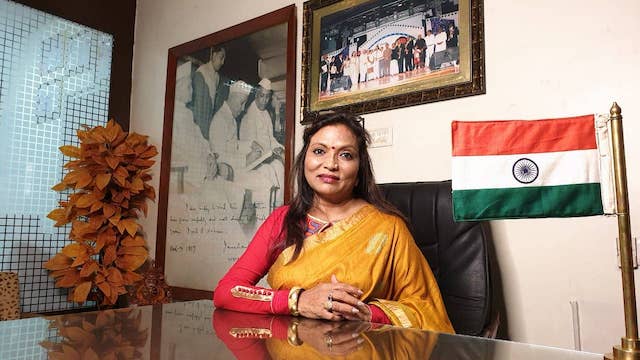
Born to a Dalit family in Roperkheda village in Maharashtra, Kalpana was the eldest daughter of a police constable. She was married off at the age of 12 in a Mumbai slum, where she faced mental and physical abuse at the hands of her in-laws.
She was later rescued by her father, where she left her husband and returned to her village to live with her parents. However, after being ostracized by the villagers, a self-assured Kalpana moved back to Mumbai to live with her uncle’s family at the age of 16.
Moment of inspiration
From there, she started working in a garment factory to support her family. She successfully started a tailoring business using government loans for backward caste people and launched schemes to help the unemployed.
Kalpana then entered into the real estate business and in a short period, earned Rs. 4 crore from the property business. She even ventured into film production.
Notable success
Her most successful venture has been the revival of Kamani Tubes -- a sick company for more than two decades. She is credited with steering the company back to profits and is currently the Chairperson of the company.
Kalpana got the prestigious Padma Shri Award for Trade and Industry in 2013. She was appointed to the board of directors of Bhartiya Mahila Bank, a bank primarily for women, under the Government of India.
11. Upasana Taku: Co-founder of MobiKwik

Upasana Taku, a pioneering force in the Indian fintech industry, is the co-founder of MobiKwik, one of India's leading digital financial services platforms. Born and raised in Gujarat, Upasana pursued her education in engineering from the National Institute of Technology (NIT), Jalandhar, and later earned her Master’s degree in Management Science and Engineering at Stanford University. Her academic journey equipped her with a strong foundation in technology and business, which she would later leverage to transform the financial landscape in India. Prior to founding MobiKwik, Upasana gained valuable experience working with global giants like PayPal and HSBC in the United States, where she developed a keen understanding of digital payment systems and consumer financial services.
Moments of inspiration
The inspiration to create MobiKwik stemmed from Upasana Taku's observation of the inefficiencies and challenges in India's traditional payment systems. Upon returning to India in 2009, she noticed a significant gap in the market for easy, accessible, and secure digital payments. This realization coincided with the increasing penetration of mobile phones across the country, presenting a unique opportunity to harness technology for financial inclusion. Upasana, along with her husband Bipin Preet Singh, envisioned a platform that would simplify transactions for millions of Indians by providing a seamless mobile wallet experience. This vision led to the birth of MobiKwik in 2009, a platform designed to democratize access to financial services and empower consumers with convenience and security in digital transactions.
Notable Success
Under Upasana Taku's strategic leadership, MobiKwik has grown exponentially and established itself as a prominent player in India's fintech ecosystem. Today, MobiKwik boasts a user base of over 100 million and a network of more than 3 million merchants, offering a wide range of services including mobile recharges, bill payments, and digital wallets. One of the company's notable successes was its strategic pivot to offer financial products such as instant credit and insurance, thus broadening its service offerings and enhancing user engagement. This diversification not only solidified MobiKwik's position in the market but also contributed significantly to its revenue growth. Upasana's efforts have been recognized with several accolades, including being named in the Forbes list of Asia’s Power Businesswomen. Her journey exemplifies the impact of visionary leadership and innovation in driving financial inclusion and transforming the fintech landscape in India.
How do aspiring female entrepreneurs in India get started on their business?
Starting a business requires determination, resources, and strategic planning. Here are some steps aspiring female entrepreneurs in India can take to launch their ventures:
1. Identifying business opportunities
Aspiring entrepreneurs should begin by identifying viable business opportunities that align with their interests and skills. Conducting market research can help determine the demand for their products or services and identify potential competitors.
2. Developing a business plan
A well-structured business plan is crucial for guiding the startup's direction. It should outline the business goals, target market, competitive analysis, marketing strategies, and financial projections.
Related: How to write a business plan?
3. Leveraging Government Schemes and initiatives
The Indian government offers various schemes and initiatives to support women entrepreneurs. Programs such as the Women Entrepreneurship Platform (WEP) and the Stand-Up India scheme provide financial assistance, training, and mentorship to women-led startups.
4. Building a support network
Building a strong support network is essential for entrepreneurial success. Aspiring female entrepreneurs should seek mentorship, join entrepreneurial communities, and connect with other women entrepreneurs to share experiences and resources.
5. Utilizing digital platforms
Digital platforms and e-commerce provide an excellent opportunity for women entrepreneurs to reach a broader audience. Leveraging online marketplaces and social media can enhance brand visibility and increase customer engagement.
Female entrepreneurs of the future
These are just a handful of successful female entrepreneurs whose stories truly inspire. The list could be longer, indicating a positive shift in women entrepreneurship in the country. However, there’s still a long way to go.
In 2022, India ranked 135th in the world for gender gap in the overall workforce. However, this isn’t going to continue for very long. Winds of change have begun to blow.
With support from the government and the industry, and with changing mindsets, women can continue to make great strides in the world of business in the days to come. The days of women standing side by side with men in the world of entrepreneurship are not far.
The rise of female entrepreneurs in India is a promising development that holds the potential to drive economic growth and promote social empowerment. Despite facing challenges, women entrepreneurs are making significant strides in the Indian startup ecosystem.
Through government initiatives, mentorship, and a supportive network, aspiring female entrepreneurs can overcome obstacles and achieve success. Trailblazers like Falguni Nayar, Kiran Mazumdar-Shaw, and many others serve as beacons of hope and motivation for women across the country. As more women step into entrepreneurship, India moves closer to a more equitable and prosperous future.
Calling all aspiring female entrepreneurs!
Looking to start your own venture? We've got all the resources you need to help you get started! Here's a list of articles to help you start ideating on your perfect business:
- Small business ideas to start in India: a comprehensive list
- How to start an online store in India?
- How to create your own logo?
- How much does it cost to start a business in India?
- Top 20 trending products to sell online in India
- How to start a franchise business in India?
FAQs: Female entrepreneurs in India
Q: Who is the most famous female entrepreneur in India?
Falguni Nayar, the founder of Nykaa, is one of the most famous female entrepreneurs in India. Nykaa revolutionized the beauty and wellness industry in India by providing a comprehensive e-commerce platform that offers a wide range of products from global and domestic brands. Under Falguni's leadership, Nykaa became a household name and a successful business model for aspiring entrepreneurs.
Q: Who is the youngest female entrepreneur in India?
Radhika Gupta, the Managing Director and CEO of Edelweiss Asset Management, is one of the youngest and most successful female entrepreneurs in India. Known for her resilience and innovative approach, Radhika has made significant contributions to the finance sector and serves as an inspiration to young businesswomen across the country.
Q: Who is the No 1 businesswoman of India?
Indra Nooyi, the former CEO of PepsiCo, is often regarded as the No 1 businesswoman of India. Under her leadership, PepsiCo achieved remarkable growth, focusing on healthier products and sustainable practices. Indra's visionary leadership and commitment to corporate responsibility have made her a global icon in the business world.
Q: Who was India's first female entrepreneur?
Kalpana Saroj is recognized as one of India's first female entrepreneurs. Rising from humble beginnings, she overcame societal challenges to become a successful businesswoman. Kalpana is the Chairperson of Kamani Tubes, and her entrepreneurial journey is a testament to resilience and determination.
UPDATE: This post was first published on 4 March 2021, and updated on 19 August 2022 and 6 January 2025. Charu Dubey contributed to this article.

